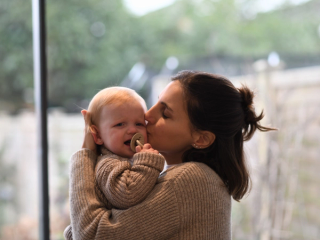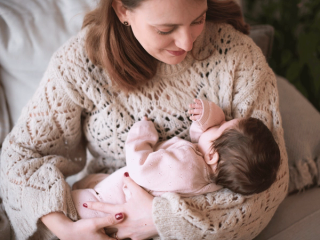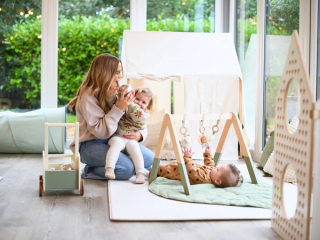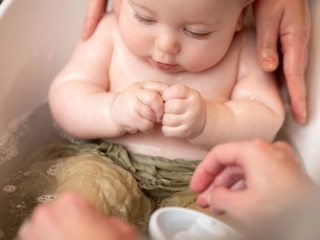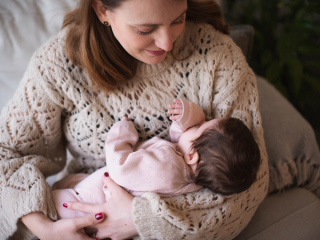
- Home
- Advice Hub
- Newborn
- New Parent Support
- Why Midwife Support Matters After Birth
The importance of postpartum care from your midwife
Discover why postpartum care from your midwife is so essential for you and your little one.
Bringing a new life into the world is a profound and beautiful experience, but it's also one of the most transformative times in a woman's life. As they say, "it takes a village," and when it comes to postpartum care, your midwife can be an invaluable member of that village. From ensuring both you and baby are physically well to supporting you emotionally through this time of change, let's explore why postpartum care from your midwife is so essential.
Postpartum care
Having a baby is an amazing time that comes with lots of new challenges, both physically and emotionally. It's important to have a support system in place during this time, and postpartum care is a vital part of that system. We often have a lot of focus on pregnancy and birth, but less so on the postnatal period.
Your midwife can provide you with essential postpartum care, which includes everything from breastfeeding support to advice on dealing with common concerns like sleep deprivation, bleeding and 'baby blues'. Postpartum care can help you adjust to your new role as a parent and ensure that you're healthy, happy but also confident.
The benefits of postpartum care
Providing reassurance
Dealing with a new baby can be stressful, but having regular postpartum check-ups can help to reduce your stress levels and provide you with some much-needed reassurance. Knowing that someone is there to help you with any concerns can make a big difference.
Improved physical health
Postpartum care helps to ensure that you recover well from childbirth and avoid any complications. Your midwife will be checking you and your baby over for many things such as infection and offering you follow up tests and checks. Your midwife will also give you the opportunity to discuss any concerns about your physical health with them or sign post you to another specialist healthcare provider who can help.
Improved mental health
The first few weeks after childbirth can be tough emotionally, and postpartum care can help by providing support and information on common issues like postnatal depression. Talking to someone who understands what you're going through can be incredibly helpful.
How your midwife can help you with postpartum care
If you have had a vaginal birth your midwife will assess your perineum (the area between the vagina and anus) and make sure you are healing properly. She will also check your blood loss and ensure that your uterus is returning to its normal size.
Second, your midwife can help you with breastfeeding. They will support you to position and latch your baby, and give you tips on how to overcome common challenges such as sore nipples or engorgement. They can also refer you to a lactation consultant if needed.
Third, your midwife can provide emotional support in the postpartum period. This is a time when many women experience the ‘baby blues’ and postpartum depression. Your midwife can offer guidance and reassurance, and connect you with resources or refer you to a specific colleague who can help further – if necessary. This may be someone from the mental health team or a GP referral.
Your midwife can answer any questions or concerns you have about your postpartum body or baby.
Additional resources for postpartum care
- La Leche: This website provides friendly breastfeeding support from pregnancy and beyond.
- Maternal Mental Health Alliance: This charity provides information and support for perinatal mental health services.
- Tommys Charity: This website provides a wealth of evidence-based information on pregnancy, birth and postnatal care, founded by doctors.
- The Royal College of Obstetrics and Gynaecology: This website provides evidence- based guidelines and patient information leaflets.
- The Royal College of Midwives: This website provides information on the importance of postpartum care and what you can expect from your midwife during this time.
- Postpartum Support International: This website offers support and resources for women who are experiencing postpartum depression.
- The Modern Midwife's Guide to The First Year: this book provides a friendly yet comprehensive guide to the first year after birth.
Further support for new mums
As a new mum, you may feel like you are on an emotional rollercoaster. You may feel joyful one minute and then quickly become overwhelmed the next. This is normal! Your feelings are likely due to the hormonal changes your body is going through. Your midwife can provide you with support and guidance during this time and is always happy to talk through what you're thinking and feeling. No question is ever a silly question. If you are struggling with anything, do not hesitate to reach out to your midwife for help.
Looking after yourself in the postpartum period
After giving birth, it’s normal for your body to go through some changes. Depending on your delivery method, you may have some vaginal soreness, bleeding, or bowel changes. It’s important to follow the postpartum care instructions from your midwife to help your body heal and prevent infection. Here are some easy tips for optimising the benefits of postpartum care:
- Rest when you can – When you’re not caring for your baby, take the opportunity to rest and go easy on your recovering mind and body. Your body is going through a lot of changes and needs time to recover. Ask for help from friends and family or visitors so you can look after yourself too.
- Eat healthy foods – Eating nutritious foods will help your body heal and give you energy. Consider continuing with pregnancy supplements. Drink plenty of fluids, especially water, and eat foods high in fibre to avoid constipation. Avoid caffeine and alcohol as they can interfere with sleep and recovery.
- Take baths – Once any wounds are healing well, sitting in a warm bath can help reduce soreness and relax your muscles. You can add a few drops of lavender to supporting healing and aid calming. Avoid scented soaps and Bubble Baths as they can irritate your vagina during this sensitive time.
- Wear comfortable loose clothing – Clothing that is too tight or binding can be irritating and there's no rush to 'bounce back'! Choose loose-fitting clothes made from natural fabrics like cotton that will allow your skin to breathe.
Postpartum care from a midwife is essential for both mother and baby. Your midwife can help you navigate any difficulties that may arise following the birth of your baby. With the right postpartum care plan in place and support from your midwife, new mothers often feel much more equipped to cope with their unique situation.
Advice & tips

Want to read more? Join the HiPP BabyClub for full access to this article.
As a BabyClub member, you'll get access to a range of exclusive benefits, including:
Monthly competitions
Discounts from our Partners
Expert advice tailored to your little one's age
Weaning recipes
HiPP shop discounts*
*10% off HiPP's online shop does not apply to our First Infant, Anti-Reflux or Comfort Formula Milk.
Important notice: Breastfeeding is best. Follow on milk should only be used as part of a mixed diet from 6 months. Talk to a healthcare professional.





